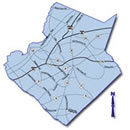ADR Processes
Service Provider List
 |
Civil Mediators |
 |
Domestic Mediators |
 |
Attorney Arbitrators |
 |
Case Evaluators |
 |
Probate Mediators |
Mediation
Mediation is a process where a neutral third party, the mediator, facilitates settlement discussions between parties in conflict. The mediator has no authority to make a decision or impose a settlement upon the parties. The duty of the mediator is to facilitate communication and seek solutions so the parties may reach their own agreement. Any settlement is entirely voluntary.
In the absence of settlement, the parties retain the right to take their case before the court. However, even partial agreements can help the parties narrow the issues involved and limit the time and expense of going to court. The issues that cannot be resolved in mediation will be returned to the court and the assigned judge. Mediation is an alternative to court, in which YOU have control over the final outcome.
Benefits of Mediation
- Promotes communication and cooperation.
- Benefits children by reducing conflict.
- Private and confidential, thus avoiding public disclosure of personal problems and the stress and strain of a traditional courtroom battle.
- May be completed in less time than litigation, saving you costly litigation expenses.
Cases Appropriate for Mediation
Mediation can be a beneficial alternative to trial in many different type cases and is especially so in cases where there are highly emotional issues involved or where there is a continuing business or personal relationship.
Domestic Cases
Mediation is beneficial to parties regarding disputes during and after divorce, particularly when children are involved. A mediator helps focus the parents on the needs of the children and make decisions that are in their best interest. Mediation facilitates solutions for the day to day care of children, division of property, and financial arrangements. However, if violence has occurred during a relationship, the case may not be appropriate for mediation, and the Office of Dispute Resolution should be contacted before considering mediation.
Civil Cases
Mediation can be beneficial in almost any type of civil case ranging from contracts to personal injuries. Cases where there is a continuing personal or business relationship or where there are highly emotional issues involved are particularly suitable. Mediation allows you to draft creative resolutions that better satisfy all parties.
Length of Mediation
The length of the mediation and the possibility of additional sessions will vary according to the case and number of issues involved. Plan to spend a minimum of two hours at your initial session.
Cost of Mediation
The mediators set their own fees, and fees range from $100 to $300 dollars per hour. The fee for a mediation session is divided by all of the parties.
Attendance
Mediation is not a substitute for legal advice and the mediator does not give legal or financial advice. The mediator focuses on helping participants reach their own agreements and does not represent either party. Lawyers advise their clients on the law and complete the legal process. If you are represented by counsel, generally counsel is required to be present for the mediation.
The mediation process will involve only the parties to the case and their attorneys. The presence of others may create animosity and ill feelings even before the mediation begins. Children are not allowed in the mediation session and child care is not provided.
Preparation
You can prepare for mediation by determining your specific interests that need to be addressed in order to develop a settlement plan. Outline the issues you would like to convey to the opposing party and the mediator. Bring any documents you find relevant to your position.
In domestic cases, a copy of your financial affidavit must be filed with the court and brought to the mediation session. You may also need to bring business records, tax returns, documents relating to property values, and account balances. What you need to bring will depend on the issues involved in the dispute. Remember, a financial affidavit is always required. The better prepared you are for the mediation session, the more likely the chance of success.
Issues Resolved in Mediation
If an agreement or partial agreement is reached, the mediator will prepare said agreement, and review same with the parties. If attorneys do not attend, the parties will have ten (10) days in which to have the agreement reviewed and approved by separate attorneys for each party. The Plaintiff is responsible for having the agreement drawn to present to the court. Any issues that are not resolved in mediation will be returned to the assigned judge.
Arbitration
In the arbitration process, an arbitrator, generally an attorney or retired judge, is empowered to issue a decision following an abbreviated hearing under informal rules of evidence. As with the mediation process, arbitration may also be utilized in a wide variety of cases. It is not conducive to domestic cases because it does not promote communication between parties, but is more similar to a trial. Contract and tort cases are examples of the cases that may benefit from the arbitration process.
Some of the benefits derived from arbitration come from the shorter hearing compared to a trial and an earlier hearing before time and money are spent on extensive discovery and motions before the court.
The arbitration may be conducted with one arbitrator or a panel of arbitrators. In non-binding arbitration, the arbitrator renders a decision which becomes the order of the court unless either party files a post-arbitration demand for trial within 30 days of the arbitration hearing. In a binding arbitration, all parties must be in agreement prior to the hearing that the decision will be binding and final.
Case Evaluation
Case evaluation or early neutral evaluation is always conducted by a retired judge or an attorney with extensive experience in litigating the matter in dispute. The evaluator reviews the case with the litigants and their attorneys, gives advice on the strengths and weaknesses of each party's position, and may make an assessment as to how a judge or jury might react in the particular case. The evaluator may also assist the parties in narrowing the legal and factual issues in the case. In an early neutral evaluation, the conference occurs early in the discovery process and is designed to "streamline" discovery to help in shortening the life of the case, and decrease delays in the litigation process. This is very useful in cases with multiple parties and numerous claims which involve complex legal issues. Case evaluation differs from early neutral evaluation in that the goal is more likely to be reaching a settlement of the case. Case evaluation is used later in the life of a case when the parties have enough information to talk settlement after the evaluator issues an opinion.
Scheduling an ADR Session
If you have a case filed with the Gwinnett County Courts and are interested in an ADR session,
- Contact the judge's office to which your case is assigned. The judge may require the consent of both parties before sending the case to an ADR process or the judge may order an ADR process at the request of one party.
- Obtain the judge's order assigning the case to an ADR process.
- All parties agree upon an ADR provider, date, and time within the frame specified by the judge. If you cannot agree, the court will appoint one for you. A list of ADR providers with a concise biography stating their professional and educational background and rate of charge may be found at this web site.
- Contact the Dispute Resolution Coordinator to schedule the ADR session. Sessions may be scheduled at the Gwinnett Justice and Administration Center at 9:00 a.m. and 1:00 p.m. weekdays. You may need to be prepared with an alternative date due to limited space.
ADR Contact
The Office of Dispute Resolution at:
Administrative Office of the Courts
75 Langley Drive
Lawrenceville, GA 30046-6900
Phone: 770-822-8587
Fax: 770-822-8588
or e-mail: Abby.Carter@gwinnettcounty.com




